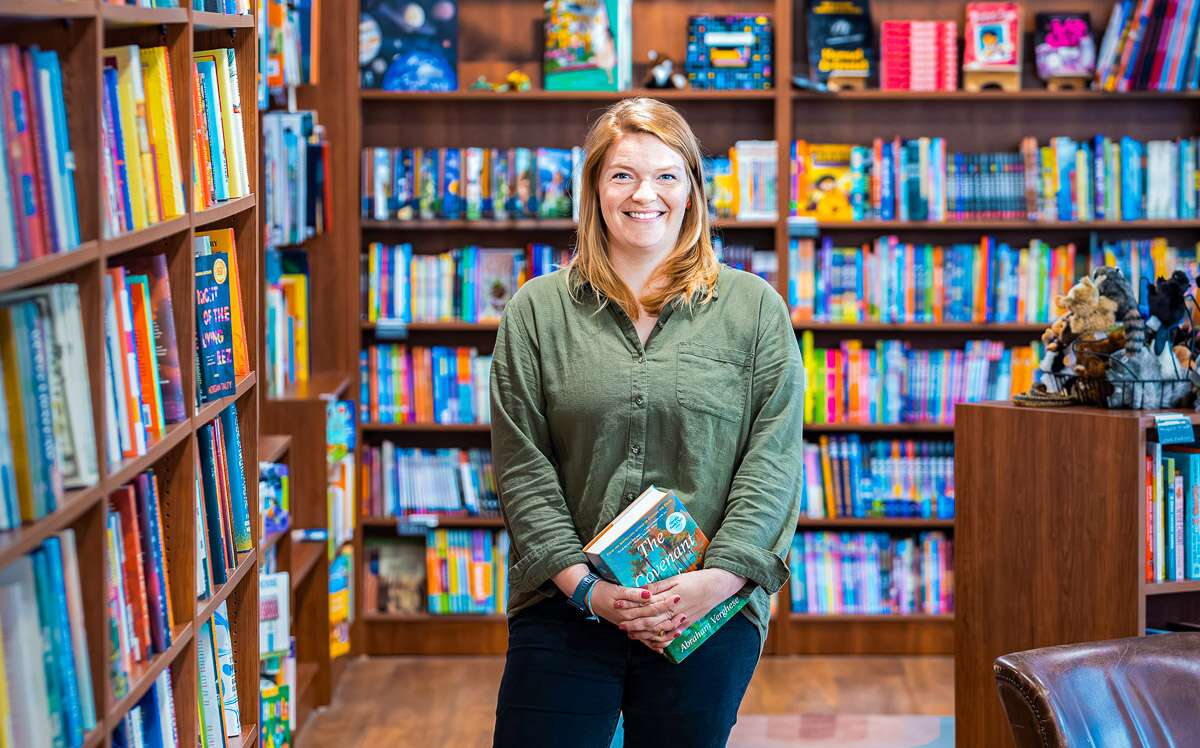
Processing Your Payment
Please do not leave this page until complete. This can take a few moments.
Turning the page: Maine boasts growing crop of independent bookstores, book-themed startups
 Photo / Tim Greenway
Becca Morton owns Back Cove Books in Portland's Woodfords Corner neighborhood.
Photo / Tim Greenway
Becca Morton owns Back Cove Books in Portland's Woodfords Corner neighborhood.
Grump and sunshine, a term often used to describe the opposites that attract in romance novels, is the inspiration behind the name and focus of Belfast’s newest bookstore. Open since May, the one-person operation is one of three bookstores in the 7,000-population waterfront city.
“Every little girl who loves to read wants to start a bookstore at some point,” says Cassidy James Taylor, owner of Grump & Sunshine Bookstore.
While happy endings aren’t guaranteed in the love-themed tomes she stocks in her store, Taylor aims to write her own business success story as she joins a growing crop of independent booksellers in Maine. Undaunted by competition from Amazon and large retailers as well as declining U.S. reading rates and book sales, bibliophiles-turned-booksellers are launching new stores and taking over existing ones across the state. The spate of book-themed startups extends to a pair of early-stage technology ventures and a Camden-area bookstore-on-wheels in the planning stages.
“I’d like to think we have so many independent bookstores because of the independent spirit in Maine, and people’s appreciation for personalized attention,” says Diane Sturgeon, the U.S. Small Business Administration’s Maine district director. Speaking as a consumer, the Searsmont resident says that while she orders from Amazon for her e-reader, she is a fan of independent bookstores because “nothing beats an actual book in your hand, and those ‘batteries’ never die.”
Similarly, the majority of respondents to a Mainebiz Flash Poll say they buy their books wherever available, with independent bookstores the most popular by far.
Defying headwinds
The number of U.S. bookstores dropped from 12,151 in 1998 to 6,045 in 2019, according to census data from 2021.
Today, bookstores seem to be making a modest comeback, according to a report published last year by the American Booksellers Association. It showed that 254 bookstores opened last year, or five times the number of businesses that closed, with another 198 in the pipeline set to open within the next one to two years. Of the 254 new businesses, 179 were storefronts, 42 were pop-ups, 23 were online and 10 were mobile.
In Maine, there were 37 bookstores reported at that time, employing a combined 212 people earning nearly $5 million in wages and salaries. In a state with a population of 1.3 million, that translates into one bookstore per 35,000 Maine residents, compared to the national average of one bookstore per 54,299 people.
Within New England, Maine is second only to Vermont, according to the New England Independent Booksellers. Beth Ineson, executive director of the Boston-based nonprofit trade group, offers a mixed outlook for independent booksellers.
“On one hand, new stores are opening at a clip and the communities that support them are committed to shopping local. It’s this consumer support that makes up the backbone of the success of so many stores, along with the fact that bookstores represent an enriching third place for people to discover ideas, entertainment and community,” she says.
“On the other hand, headwinds have never been stronger,” she says. “Competition from national online retail, a steady decline in the reading habits of a nation, and the challenging financial model of the publishing industry as it intersects with retail all conspire to make it a tough climate to own a bookstore. And yet they persist, which is a testament to the store owners and staff, and the community they build in their cities and towns.”
New bookstores, new owners
In Portland’s Woodfords Corner neighborhood, Becca Morton is new to business ownership. She opened Back Cove Books last October in a first-floor corner spot with 1,700 square feet of selling space in a 19th-century building owned by the Odd Fellows fraternity.
Located in a former pawn shop, the store is an oasis of calm on a busy intersection, furnished with comfy sofas and chairs and art on the walls and windows by local artists.
“Portland is a magical place of creative people, and it’s been really fun to get to know people in the community and work with them in different ways,” says Morton, who got her introduction to bookstores as a part-timer at Print: A Bookstore, on Munjoy Hill. She also had a few virtual days of training from Paz & Associates, affiliated with the American Booksellers Association.
Today at Back Cove Books, she leads a team of seven employees at a store open seven days a week, with regular author talks and other events.
She’s unable to price her books lower than what is set by each publisher to compete with Amazon and other discounters. But local bookstores offer something else.
“We’re providing the exact same books, but Amazon is never going to remember your face or your name or invite you in for a coffee or give your dog a biscuit,” she says. “Post-COVID, people want to gather again and are recognizing the value of small businesses that are local and that know you. And I think that independent bookstores are huge for that.”

While Morton started her business from scratch, others opt to buy existing enterprises. One example is Johanna Barrett, who acquired Compass Rose Books in Castine in 2018.
“Business continues to be good this year, and our forecast for the next 18 months is also very good,” says Barrett, who employs three part-timers from May through October and two part-timers in the off-season. Currently looking for someone to run the store’s café full-time and eventually own it, she cites labor as the biggest area of need.
“My ability to wear all the hats and work seven days a week is limited, year over year, so in that sense, small bookstores by the sea are a fragile endeavor under the best of circumstances,” she says.

Newer to ownership are Julia Clapp and Tiffany Howard at Left Bank Books in Belfast, who bought the business from two of the original owners last year.
Clapp started at the store part-time in 2013 as a college student, while Howard started part-time in 2018 after selling Opera House Video next door. Today, the two employ a staff of seven, including the previous owners, who are working part-time in retirement.
The business, which opened in Searsport in 2004, moved to Belfast in 2012. Determined to keep Left Bank Books going for some time, the two are still adjusting to their new roles as owners.
“It’s a lot of work, a lot of responsibility and [it’s] hard to shut it off sometimes,” Howard admits. “It’s a learning process.”
Other business models
Outside the traditional bricks-and-mortar business model, OurShelves is a Cumberland-based online subscription service for children’s books featuring diverse characters and inclusive themes. The business and advocacy effort, founded in 2018 by Alli Harper, fills orders for families, teachers and librarians nationwide and for customers at overseas military bases.
“We love that our model extends the reach, and renders more accessible, such special diverse children’s books that affirm our collective values,” Harper says. She adds that the business is the strongest it’s ever been “as we face an ever-increasing urgency for our expert-curated diverse children’s book boxes, given our nation’s current cultural and political context.”
Among Maine’s book-focused tech startups, ReMo is a literacy-focused educational tool, while Bookclubs helps users organize book clubs, find one or join, or connect with fellow readers.
“Book clubs have been around for eons, but lack of organization can cause a lot of book clubs to fail,” says Anna Ford, the company’s co-founder and CEO. “We have really innovated on the technology side of things, making it very simple for clubs to get organized and stay longer based on how a club operates.”
Founded in 2019, Bookclubs has grown to 600,000 users and more than 50,000 book clubs, with funders including the Maine Technology Institute and the Maine Venture Fund.
ReMo, also founded in 2019, is a web-based application that empowers educators and students in grades four to 12 around independent reading through the use of data. Last year alone, more than 1,000 students and 37 teachers used ReMo. CEO Michelle DeBlois sees big long-term growth potential for the platform.
“We believe every student has the capability to be an amazing reader,” she says.

Promoting access to books and literacy is also top of mind for Jill Conner in planning a mobile Camden-area bookstore in a 1963 lime-green Ford Econoline truck named Gladys.
“Our hope is to take the profits and donate books to libraries and schools and literary programs,” Conner says. “Books are a pathway to the world.”
Rural bookseller wanted
As many entrepreneurs come into the book business, Heidi Carter is preparing to leave, five years after opening Bogan Books in Fort Kent. The shop is located steps from the start of U.S. Route 1 and the Canadian border.
A graphic designer and marketer for two decades, she’ll be starting a new professional chapter at the University of Maine at Fort Kent and is looking to sell her business. Several prospective buyers have already shown interest.
“The next owner,” Carter says, “should have a passion for literacy and books, care about the local community, believe in small business, and enjoy building relationships and breaking down boxes.” That shouldn’t be a problem in Maine.















0 Comments